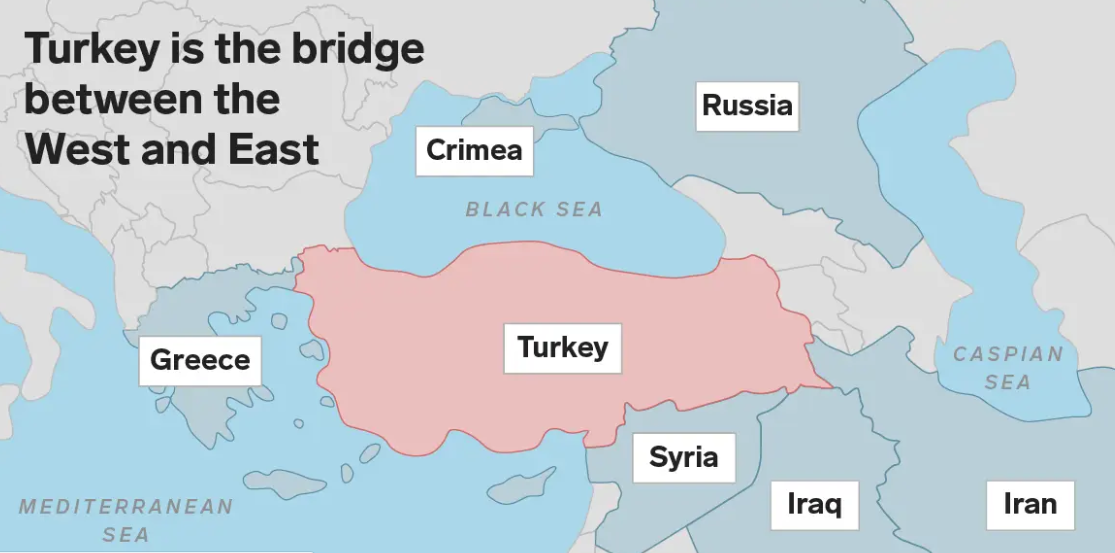Um dos países mais afetados pelo Coronavirus no mundo é o Irã (mais de 200 mortos até agora). O Irã tem presença expressiva na Síria, além de iraquianos, paquistaneses e marroquinos.
Recentemente, 33 soldados turcos, que estão na Síria, foram mortos em um ataque aéreo. Dizem que foram as forças aéreas russas, mas a Turquia acusa o governo da Síria. Combater a força aérea russa é mais complicado, não é mesmo?
Em todo caso, por causa disso, ou aproveitando isso, o governo da Turquia resolveu abrir as portas da fronteira com a Síria e deixar que centenas de refugiados avancem para a Europa em tempos da epidemia do Coronavirus. O repórter do vídeo acima diz que a Turquia quer forçar a Europa a combater o governo sírio. Mas acho que ele não conta a história toda
É o pesadelo europeu. Europa paga milhões para que a Turquia segure os refugiados. Pesadelo que vem junto com um vírus letal.
Bom, não se pode esperar que o governo do ditador Erdogan seja bonzinho, né Europa? Afinal, não é boa chance de destruir a economia e a vida nos países europeus com o vírus?
Aliás, se a história ensinou alguma coisa na Europa é que não se pode confiar na Turquia.
Vejam abaixo reportagem e vídeos do Zero Hedge abaixo:
European Nightmare As Turkey "Opens The Gates" On Refugees While Covid-19 Ravages Nearby Iran
As coronavirus ravages Iran and threatens to spread through the broader Middle East, potentially hitting refugee and war-torn populations hardest, it appears Erdogan is now making good on prior threats to "open the gates" of a flood of refugees on Europe. On Friday top Turkish officials were quoted as saying Turkey has no choice but to "loosen" its stance on the some 3.4 million refugees it is hosting.
This was the immediate, and perhaps predictable reaction, to Thursday's dramatic escalation involving the deaths of some 33 Turkish soldiers in Idlib via airstrike, in the single deadliest day for Turkey in Syria throughout the entirety of the war. Widespread early reports said it was a Russian strike, but in a sign that Ankara doesn't want to confront the more formidable Russian Air Force, it has blamed Syrian forces.
Turkey has announced it has opened its until now sealed border with Idlib for at least 72 hours, and will allow unhindered passage of refugees to Europe.
So it begins, as Middle East Eye reports:
Turkey will open its southwestern border with Syria for 72 hours to allow Syrians fleeing the pro-government forces' assault free passage to Europe, Turkish official sources have told Middle East Eye.The decision came after a security meeting chaired by Turkish President Recep Tayyip Erdogan in Ankara late on Thursday after 33 Turkish soldiers were killed in Syria's Idlib province.A senior Turkish official said on Thursday that Syrian refugees headed towards Europe would not be stopped either on land or by sea.
The European Union is downplaying the fact that crowds of Syrian refugees have already been seen en route to Greece via land borders as well as the Aegean Sea.
Buses in Istanbul were filmed providing transport to refugees and migrants to the Bulgarian and Greek borders.
An EU spokesman was quoted in Reuters as downplaying the potential "flood" from Turkey coming: "I would like to stress that there was no official announcement from the Turkish side about any changes in their asylum seeker, refugee or migrant policy," the spokesman for the EU's executive said. "So from our point of view the EU-Turkey statement ... still stands and we expect Turkey to uphold its commitments."
But the reality on the ground may quickly prove these words moot:
Al Jazeera's John Psaropoulos, reporting from Athens, said the situation was "a European nightmare" as "the floodgates [are] being opened".
As European officials mull whether this is but more of Erdogan's threats or perhaps an early "taste" of what's to come, or whether the flood has begun, Greece and Bulgaria have begun taking action, bolstering patrols along border areas with Turkey.
If you are a refugee in Turkey, this is what you are watching the whole day on TV.
Live coverage with a clear message: borders are open to go to Europe.
"Hundreds of Syrian refugees in Turkey have begun preparing to travel towards the country’s borders with Greece and Bulgaria after Ankara’s sudden decision to no longer impede their passage to Europe," The Guardian reports early Friday.
"Turkish police, coastguard and border security officials were ordered to stand down overnight on Thursday, Turkish officials briefed reporters," the report adds.
Greece appears to be responding by completely shutting any Turkish border access point to any and all traffic.

nd further, according to The Guardian: "Turkish news agency Demirören showed footage of what it said was 300 people, including women and children, walking on highways and through forested land in north-west Turkey towards the EU border early on Friday. Syrians, Iranians, Iraqis, Pakistanis and Moroccans were among those in the group, it said."
The WHO is especially concerned of an outbreak among refugee populations in war-torn regions of Iraq and Syria.
"Refugees and internally displaced populations across Iraq and Syria have been identified as the most vulnerable groups in the region, should the spread of the virus become a pandemic," The Guardian reports of recent statements.
"Health officials in both countries remain under-equipped to deal with such a a reality that seems more possible with each passing day," the report added.

Sprawling and densely packed "tent cities" of refugees along the border areas of Syria remain the most vulnerable.
Needless to say, we now have a dual crisis unfolding that's indeed even more of a "nightmare" for Europe and the world than many could have predicted: a refugee flood, borders being opened, and the global threat of Covid-19.






